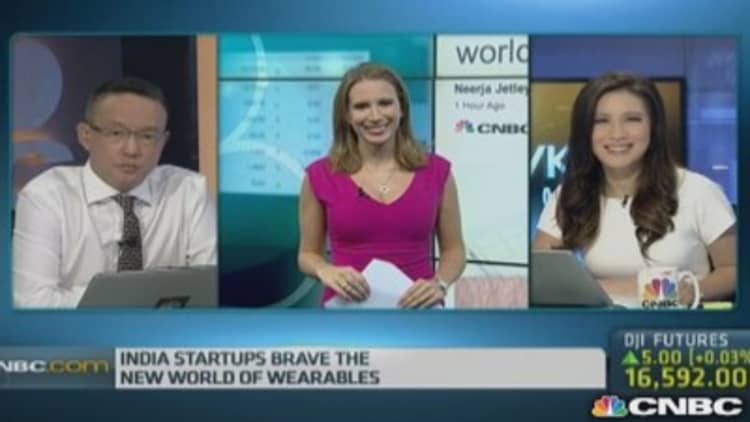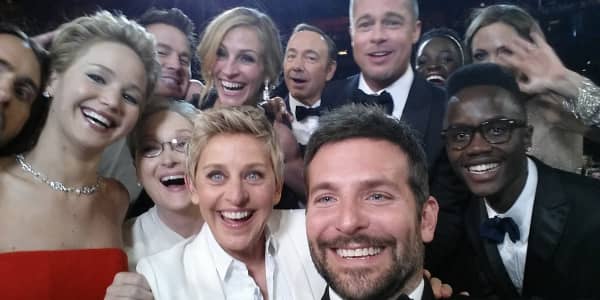
A shoe that talks and tells you where to go, a wristband that connects to a personal trainer and a ring that can switch on home appliances at a touch; welcome to the brave new world of wearable technology from India.
Even as wearable tech becomes fashionable in the west with offerings such as Google glasses and Nike's FuelBand, India—home to technology heavyweights like Infosys and Tata Consultancy services— is upping the stakes in the wearable gizmos market with a slew of startups from Bangalore to Chennai and Hyderabad innovating and looking towards world domination.
In Mumbai, entrepreneur Vishal Gondal has funneled some of the $100 million he reaped from sale of his gaming company to Walt Disney in 2011, into a startup with an eco-system built around a fitness band called Goqii.
Read MoreIndia's seniors drive a business wave
Goqii not only monitors the calories burnt, distance covered or sleep patterns of wearer, but connects to a live trainer to provide the human touch in workouts conducted via phone or video calls. Gondal recently tied up with Indian online retailer Snapdeal.com to sell six-monthly and yearly packages for $100 and $165, respectively. The plan is to hit the global market by the end of the year.
Over at the Hyderabad-based Ducere Technologies, engineering duo Krispian Lawrence and Anirudha Sharma have devised a take-me-along smart shoe called Le Chal that connects to the smart phone via blue tooth. Tell the shoe where to go and it will vibrate to indicate where to turn or how many calories a particular route will burn. Should you prefer your own shoe, a smart insole is also available to do the task for you. Le Chal was launched in March, with initial proceeds used to subsidize the product for the visually-impaired.
The company has received 3,000 pre-orders so far. "We plan to sell 100,000 units by the end of this fiscal year and introduce more wearable tech under Lechal in 6-8 months," said Lawrence, who is CEO of Ducere Technologies.
Both companies are catering to a market that's warming up to wearables in a big way. According to consulting firm IDTechEx, global spending on wearable technology will rise to $70 billion in 2024 from $14 billion in 2014.
Read MoreHow big data has changed India elections
In a separate Accenture survey carried out early this year on the appetite for wearable gadgets, Indians ranked the highest in the world in terms of readiness to buy, with the breakdown showing 80 percent keen on fitness monitors, while 76 percent and 74 percent were keen on smart watches and eyeglasses, respectively.
As a country with a strong bias towards technological achievements and one that churns out 1.5 million engineers every year, it's natural that entrepreneurs would gravitate towards the market for wearable technology.
Case in point, Kochi-based N. Rohildev, an engineering graduate at Kathir university, has developed a ring last year to be worn on the thumb, that can send an emergency alert, control the music playlist, pick up a call or silence the phone or operate home appliances.
The product priced at $120 plans to begin shipment by end-September this year and has received more than 1600 customers through a crowd fund campaign. "The idea behind the ring is that technology should be least obtrusive and minimal while facilitation interaction with world," said Rohidev.
"India's unique advantage is its huge pool of engineering plus design talent and a young population passionate about creating as well as using technology that puts us ahead of others," said Gondal, noting that he had signed up 1,000 eager people for the BETA testing of the Goqii fitness band.
Read MoreSolar ATMs changing the face of banking in India
Funding platforms
Helping the young innovators are the many platforms available for crowd funding and angel investors who are willing to invest in innovative technology no matter where it originates in the world.
Gondal has roped in nutritionist, doctors and an impressive list of angel investors from companies like Google, Flextronics and Seagate into his "Goqii Life." Ducere Technologies, meanwhile, has raised $2 million this year from angel investors. And RHL Vision is talking to investors for its second round of $1 million funding. "Most of our customers are from U.S. and Europe," says Rohildev.
The biggest challenge for the entrepreneurs, is that the market for wearables is still nascent and people who buy the products are gadget lovers when in fact, wearables are being marketed as lifestyle products.
"The challenge for us will be to breakout of the 'gadget' mindset and highlight the fashion aspect of our products. I think that would allow our products to have a more mainstream appeal," said Ducere's Krispian.
People need solutions to a problem and wearables to a large extent don't fall into the criteria so the risk is, they could become a fad and eventually fade out, Gondal added.
Read MoreClone wars: How start-ups take on the copycats
Regardless, pundits are unfazed, with some believing wearables will mark the next revolution in technology.
"Fifteen years ago the super computer was less powerful than today's smart phone," said Ducere's Lawrence. "In 5-10 years from now, wearable technology will be more powerful, intuitive and unobtrusive than the smart phone. The future lies here."




